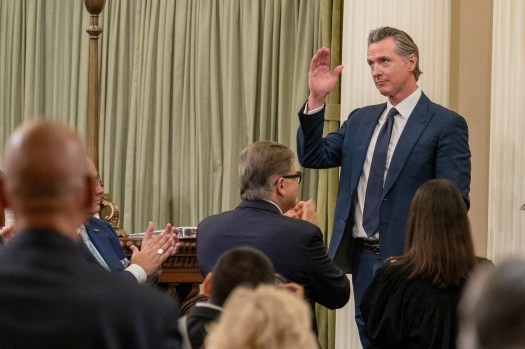California Governor Gavin Newsom has concluded the legislative session by signing a total of 794 bills and vetoing 123 others, a move that has sparked mixed reactions among Californians. The October 12 deadline for these decisions has passed, leaving a significant impact on various sectors, including education, housing, and public safety.
One notable aspect of Newsom’s vetoes is his rejection of five reparations-related bills aimed at benefiting the descendants of enslaved individuals. These measures would have prioritized their access to university admissions, business licenses, and a state first-time home loan program. According to KQED, the bills were designed to navigate California’s prohibition on racial quotas. Newsom deemed some of these proposals legally questionable, a position that aligns with his cautious approach as he considers a potential presidential run.
In another significant decision, Newsom vetoed Senate Bill 771, a measure that sought to create civil actions against social media platforms for violations of civil rights and hate crime laws. Critics argued that the bill could undermine First Amendment rights and lead to legal complications for major social media companies, which are crucial for political support. By rejecting this bill, Newsom has likely avoided a contentious legal battle over free speech.
Despite his cautious stance on certain issues, Newsom has maintained a firm position on gun control. He signed Assembly Bill 1127, which bans the sale of new Glock handguns equipped with a design feature that allows for modification into automatic weapons. This legislation is expected to face legal challenges, potentially igniting a conflict over the Second Amendment.
In addition to gun control measures, Newsom has enacted laws that some view as catering to specific interests. For instance, he approved a bill that bans sweepstakes-style online games, a decision seen as a concession to California’s tribes, who have pushed to limit competition in the gaming sector. Another controversial measure allows Bay Area transit agencies to place sales taxes on ballots to help address ongoing budget issues.
On a lighter note, the governor vetoed a bill that would have banned non-stick cookware, while also signing Assembly Bill 435, which imposes regulations on the use of seat belts for shorter teenagers. This compromise seeks to ensure rear-seat safety but has raised concerns among parents over potential traffic citations.
One of the more impactful measures includes Senate Bill 79, which permits developers to construct high-density apartments and condominiums—up to nine stories tall—near transit stops in eight counties. This deregulatory bill aims to address housing shortages but has faced resistance from some communities. Observers, such as Chris Micheli, suggest that such measures could be beneficial if they streamline the construction of market-rate homes that many Californians prefer.
With a total of 917 legislative actions taken this session, the implications of Newsom’s decisions remain to be seen. The governor’s choices may have lasting effects on California’s socio-economic landscape, and voters will ultimately determine whether these actions will influence his political future.
